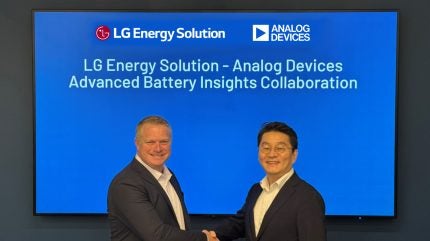
South Korean electric vehicle (EV) battery manufacturer LG Energy Solution (LGES) said it had signed a memorandum of understanding (MoU) with US based semiconductor company Analog Devices (ADI) to collaborate on development of battery management systems.
The two companies have agreed to work together for an initial two years to develop algorithms which could precisely measure the internal temperatures of EV battery cells.

Discover B2B Marketing That Performs
Combine business intelligence and editorial excellence to reach engaged professionals across 36 leading media platforms.
ADI would supply its high performance battery management integrated circuit (BMIC) for the project which was expected to help develop advanced fast charging technology.
LGES said ADI was a well known technology leader with a large focus on sustainable energy, adding “the company has a broad product portfolio, including advanced technologies in impedance measurement”.
LGES said Electrochemical Impedance Spectroscopy (EIS) was technology which measures impedance at different frequencies. ADI’s EIS products use claimed first in the market BMICs to accurately measure the impedance at controlled frequencies.
Since the impedance varies based on the battery’s state, age and temperature, its exact measurement leads to a deep understanding and diagnosis of the battery’s internal condition.
In a conventional battery management system (BMS), a separate temperature measurement device is attached to the exterior of a battery cell and once it obtains information, it is then managed by the BMIC. As traditional devices cannot measure the exact temperature inside an individual battery cell in real time, a battery’s safe charging temperature must be set to a conservative number, limiting opportunities to further enhance charging speeds.
EIS products address these limitations by precisely estimating the internal temperature of individual battery cells without the need for a separate temperature measuring device, opening the door for improving charging speeds. These were expected to contribute to improving battery performance and longevity by enhancing the safety of fast charging and accurately assessing the charging and general status of the batteries.
LGES said this technology was yet to be commercialised, although many research institutions were investigating the potential to apply it to EV batteries.
If the collaboration was successful, LGES planned to integrate its accumulated battery manufacturing and BMS capabilities with ADI’s advanced impedance measurement technology to “further enhance its battery management total solution (BMTS) and deliver additional customer value”.
LGES vice president and head of the BMS R&D Centre, Dalhoon Lee, said in a statement: “The joint effort with ADI, which has an innovative BMIC portfolio, will further strengthen the capabilities of LGES’ battery management solutions.”
Roger Keen, general manager of battery management at ADI, added: “ADI’s electrochemical impedance spectroscopy (EIS) technology is a leader in the industry for the in-application use of this amazingly insightful measurement for battery management applications.
“Our joint effort with LGES furthers the contribution ADI has been bringing to the energy transition.”






